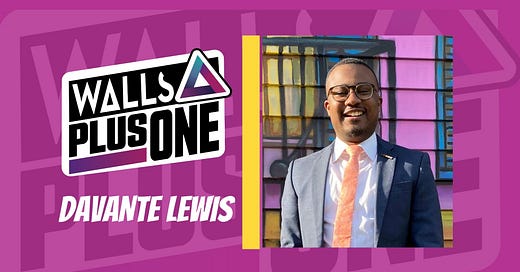Photo Caption: Davante Lewis is standing at the Walls Project mural “Welcome to Old South Baton Rouge,” created by artist Skinny Dope. The mural is located at 1100 Perkins Road and was completed in 2019. It serves as a representation of what the Old South neighborhood was before systemic issues collapsed the local economy and pushed the area into poverty. Today, efforts to revitalize the neighborhood are as bold as the artist’s palette.
This is our third interview of the first season of Walls Plus One. In this episode we’re talking to another member of the Louisiana Budget Project. Davante Lewis is Director of Public Affairs and Outreach and he’s an expert on the topic of payday lending.
Payday lending, or predatory lending as it’s also known, is a short-term loan that knowingly traps thousands of people in long-term cycles of debt. It’s a trap that is often only resolved through bankruptcy.
The Louisiana Budget Project has advocated for several years by pushing for bills to cap the interest rate at 36%. The current average is 400%. Similar bills have seen bipartisan support nationwide and have been adopted in both red and blue states. Louisiana, however, has not been able to move the bill forward.
“The reason why the cap is so important is because we know this isn’t a one time exchange,” Davante says in this episode. “The average borrower in Louisiana takes out nine loans a year. So if we’re bringing that APR down, we’re at least giving them a fighting chance to be able to repay that loan.”
During this episode, Davante mentions the 2022 effort, which is House Bill 675 by Representative Edmond Jordan (Democrat, District 29). Unfortunately, the bill was tabled and will not make it any further this year.
On the flip side, Senate Bill 381 by Senator Rick Ward III (Republican District 17) is seeking to expand services. It is currently pending final passage by the House. If signed by the governor, this bill will remove the $350 cap on the amount that can be borrowed. Instead, lenders can provide high interest loans of up to $1,500.
CLICK HERE to see the amended version of this bill
“Now, this bill I like to say is a little bit cute,” Davante explains. “What he does is he puts a 36% interest cap, but there’s a big difference between APR and interest. APR is all of the costs associated. Interest is just interest. So he caps, in his bill, interest on an installment loan that can go up to $1,500 at 36%, but he adds a $50 upfront application fee, then there’s an underwriting fee, then there is a 13% a month surcharge, then there are fees if your account is deficient or delinquent, and then there are some other things.
“So yes, he capped it at 36%, listening to the cries of the advocates as he likes to say, but when you actually calculate the APR, we’re back to 167%. So yes we’re a little bit lower, but 167% on $1,500 is very different than 400% on $350. You’re probably about the same amount of money when you think about it.”
RELATED: What’s the difference between APR and interest?
Rather than progress, he says, the bill just maintains the status quo by adding new ways of getting the same money and trapping the same people in the debt cycle.
CALLS TO ACTION
It can feel like a hopeless battle, but there are some things you can do if this conversation gets you as fired up as it got me.
Talk to anyone who will listen. Let them know what you’ve learned. Share it on social media. Tell your family, tell your friends. What you’ve learned from listening to this podcast needs to go beyond your ears.
Get involved at the level you can commit. That doesn’t have to be raising a fist at the capitol. It can be as simple sending a letter, or asking the right questions to the right people.
Look for local solutions. City ordinances can prevent more predatory lenders from moving into the neighborhoods that are most vulnerable. That means reaching out to your council member. Send them an email and ask if they would
Report what happened to you. If you’ve been a victim of predatory lending practices, you need to put your shame to the side and report it to the Better Business Bureau. They are tracking these complaints and making them known to the powers that be.
As we move into tougher economic times, it’s more important than ever to learn about your financial options. Credit Unions offer programs that will help you get the financing you need and build you up rather than taking every last dime you have.
There are about 169 credit unions in Louisiana. Do the research now so you’re not tempted to take out a high interest loan when you hit hard times. Knowledge really is the only way to keep predators at bay.
RELATED LINKS
Payday lending traps Louisianans in cycles of debt
How well do the states protect consumers against high-cost installment loans?















Share this post